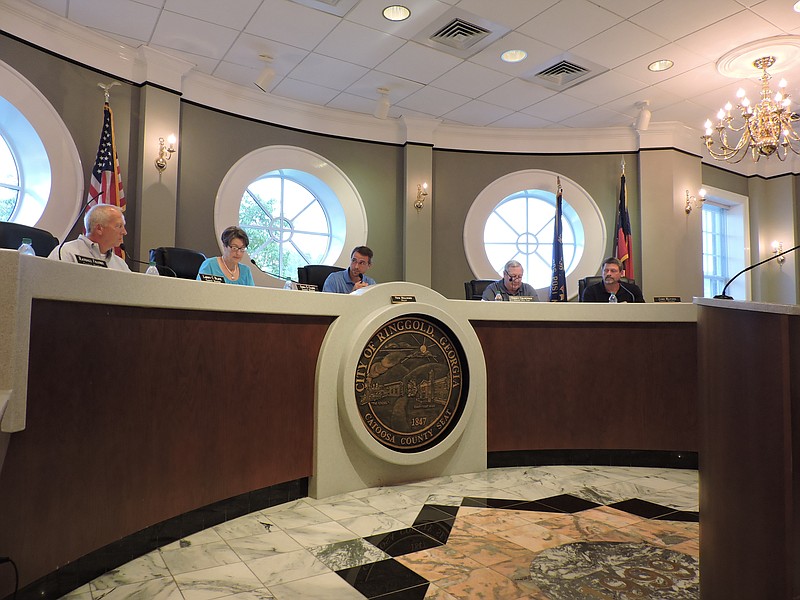RINGGOLD, Ga. - Though they're still trying to figure out how to implement it, the Ringgold City Council unanimously approved an ordinance Monday night to keep homeless people from living on public property.
The urban camping ordinance bans tents, sleeping bags, outdoor stoves and other items that homeless people use to live and sleep outside. The council previously approved an emergency ordinance last month, which immediately went into effect but lasted only 0 days. Monday's vote makes the ordinance law going forward.
The Ringgold Police Department will write people warning citations if they are in violation of the ordinance. At the same time, administrative coordinator Wayne Thaxton said, the police are trying to form a plan for what to do if they encounter the homeless.
"We're not trying to put a bunch of people in jail," he said. "That's not it. But at the same time, we can't have a homeless camp in the city without some sort of enforcement."
Upon giving the homeless citations, people will have 24 hours to move to another place. But Thaxton said the officers will have leeway to give people more time, if they need it. He wants a newly formed task force to create a hotline, where the homeless can call and explain their situation. They then can be directed to a shelter or another appropriate place to live.
If the homeless can't make a call, Thaxton said, officers should refer the people to someone who can help in person.
"We have discretion on this," he said. "That doesn't mean that, after 24 hours, we're going to rush down and arrest you."
During a work session Monday, the council debated amending the ordinance to codify a longer period of time for the homeless to find housing. They debated whether 24 hours was long enough but decided to keep the deadline unchanged.
Councilman Larry Black proposed the ordinance Oct. 8 after some Old County Road residents complained about four men who lived under the bridge down the street. One neighbor, John Banker, said people drove onto his grass next to the bridge, uprooting swaths of his yard. One time, a car got stuck in his grass and needed to be pulled out.
After that meeting, some of the men under the bridge explained they had few options. They were incarcerated earlier this year, with records of sex offenses. Adam Dax Woody, who was convicted of statutory rape in 2004, moved to the bridge at the beginning of October. James Louis Waters Jr., who was convicted of child molestation in 1998, began camping there this summer.
Both said they didn't have a place to live in Georgia. And while on probation, they are subject to an interstate compact that requires the probation office in another state to approve their move before they can cross state lines. This makes it more difficult for some men to live with their families. In Woody's case, his brother lobbied for him to move into his Cleveland, Tennessee, home, but he said Tennessee probation would not sign off on the plan because his brother has two children.
Depending on when they were convicted, some sex offenders are subject to housing restrictions that bar them from living within 1,000 feet of churches, schools or daycares. This creates another obstacle. Waters and Woody said their Department of Community Supervision officer told them to live at this bridge with a simple explanation: The officer needed to know where they sleep, and the bridge was a covered location that was not too close to churches or schools.
After Black's proposal, more Old County Road residents supported the plan. They didn't know the homeless men were sex offenders. Some said they worried for their children's safety. Councilman Terry Crawford was concerned about a cooking stove under the bridge, arguing it could create an explosion if the gas line that runs under the road leaked.
During a Nov. 12 meeting, after lobbying from multiple residents over the course of an hour, Black proposed an emergency ordinance, immediately adopting the urban camping rule. The rest of the council unanimously voted in approval, but they still needed to read it twice in public meetings to adopt a longer-lasting ordinance.
Some advocates have created short-term solutions for the men under the bridge. The LaFayette Area Correctional Task Force, which aims to find housing and other resources for recently released inmates, donated money to put some men up in apartments in Ringgold. One man, Robert Murphy, was still without housing on Nov. 15, when faith leaders and other community members held a forum on the issue.
Murphy, who pleaded guilty after an arrest in a sex sting for allegedly trying to meet an underage girl for sex, said he received a citation from Ringgold police after the ordinance passed. He believed he would be arrested if he didn't find a home. During the meeting, some members of the community donated money to put Murphy in a motel room.
Since then, members of the Georgia Department of Transportation removed belongings that were still under the bridge. A task force to look at options for the homeless has formed in Catoosa County, holding its first meeting Nov. 26. David Boyle, a member of the LaFayette task force, said the group in Catoosa County will meet again Jan. 7.
Contact staff writer Tyler Jett at 423-757-6476 or tjett@timesfreepress.com. Follow him on Twitter @LetsJett.
